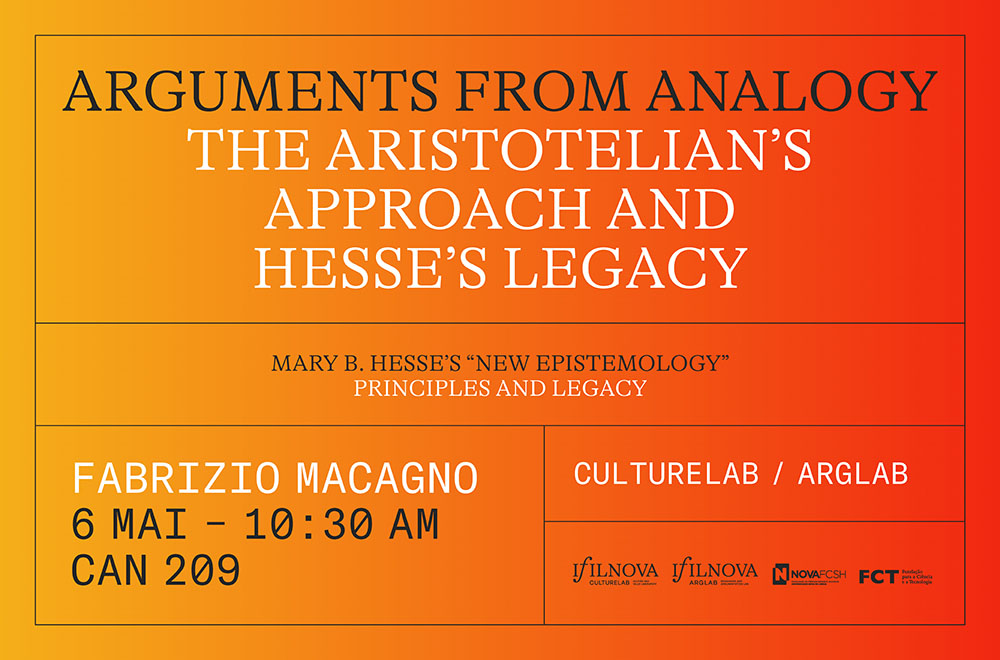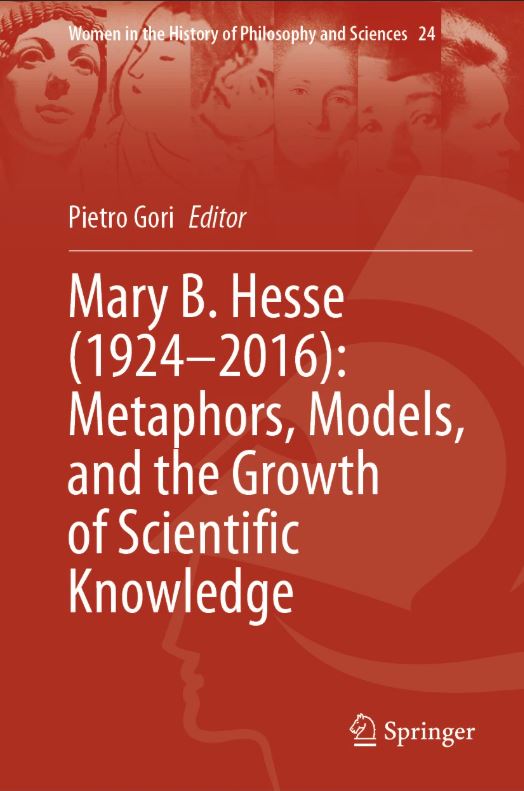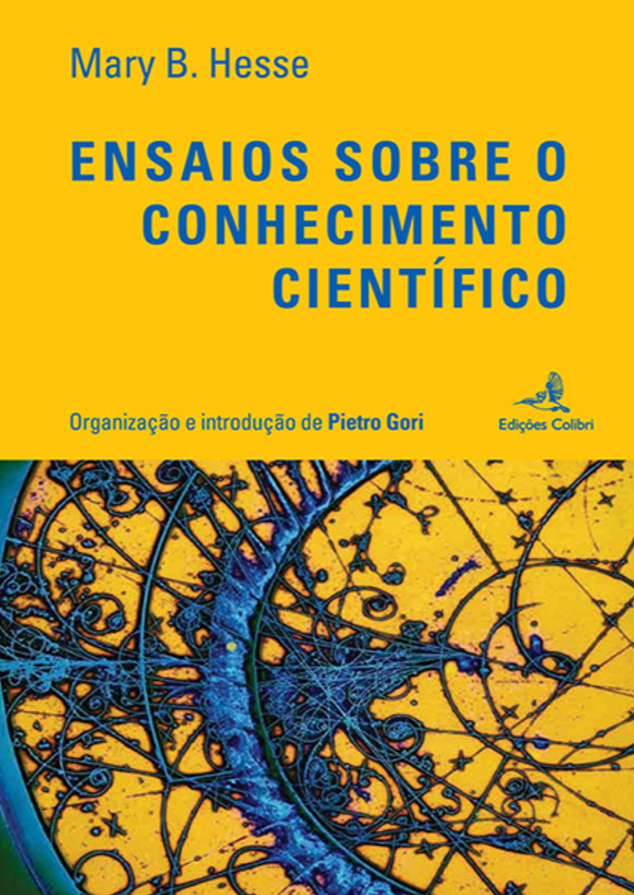Categories
Tag: scientific knowledge
Categories
New publication
The volume “Ensaios sobre o conhecimento científico“, edited by Pietro Gori, has recently been published, collecting selected texts by Mary Hesse translated into Portuguese for the first time.
The essays published in this volume outline the theoretical path developed by Mary Hesse and show the challenges that her view of scientific knowledge pose for contemporary philosophy.
As much as the work of well-known authors such as Paul Feyerabend and Thomas Kuhn, Hesse’s philosophical reflections stimulated the debate on the value and limits of scientific knowledge and contributed to the development of a broader approach to classic questions in the philosophy of science, an approach that includes methodologies and theoretical content from other disciplines: primarily the history of science, but also sociology and hermeneutics.
Further information on the volume can be found here.
On 11 November 2024 at the Center for Philosophy of Science of the University of Lisbon (CFCUL), María de Paz (Univ. Seville), Silvia di Marco (CFCUL), and Pietro Gori (IFILNOVA) will meet to discuss about Mary Hesse’s view of scientific knowledge.
During the meeting will be launched the book “Ensaios sobre o conhecimento científico” (Colibri, Lisboa; ed. P. Gori), that collects key papers on scientific knowledge by Mary Hesse, translated for the first time into portuguese.
The meeting will take place at the Faculty of Science of the University of Lisbon, room 6.2.44, starting 4 PM.
Categories
Symposium on Mary Hesse
The fifth biennal congress of the International Society for the History of Philosophy of Science that will start next week in Vienna will host a symposium devoted to “Mary B. Hesse’s Philosophy of Science and Her Legacy”.
The symposium has been organized by María de Paz, bringing together four different perspectives on Hesse, to discuss her work on the occasion of the centenary of her birth. The papers will focus on major themes explored by Hesse, as well as on her philosophical background:
– “Wittgenstein and Hesse on Metaphors and Family
Resemblance” by David Hommen;
– “Mary Hesse to the Rescue in Contemporary Realism Debates” by Laura Bujalance Fernández-Quero;
– “Hesse’s Modified Realism and Science as a Process” by María de Paz and María J. Gutiérrez-Márquez;
– “Expanding the Epistemological Framework of Natural Science: Mary Hesse (and Thomas Kuhn) on Hermeneutics, Translation, and Interpretation” by Pietro Gori.
Take a look at the complete program of the HOPOS 2024 conference here.
As an outcome of our research project a Symposium on “Pragmatism and/on Science and Scientism” has been edited by Pietro Gori and Rachel Cristy for the European Journal of Pragmatism and American Philosophy.
The aim of the Symposium is to explore the relationship of pragmatist philosophy with both science and scientism throughout the history of the tradition, from Peirce’s analysis of the representation and implementation of scientific concepts to Brandom’s contemporary pragmatic reappropriation of Hegelian epistemology for the understanding of scientific theories.
You can reach here the published issue.
Categories
Pietro Gori @EPISTRAN preliminary meeting
In the occasion of the EPISTRAN preliminary meeting that will take place on July 2023, 13th and 14th (NOVA/FCSH + online), Pietro Gori will deliver an exploratory paper titled “Expanding the epistemological framework of natural science. Mary Hesse (and Thomas Kuhn) on Hermeneutics, Translation, and Interpretation“.
The paper will be focused on Mary Hesse’s hermeneutic approach towards scientific knowledge, in relationship/comparison with Thomas Kuhn’s reflections on translation and interpretation in science.
The EPISTRAN project is financed by the Portuguese Foundation for Science and Technology, through CETAPS’ strategic programme, references UIDB/04097/2020 and UIDP/04097/2020. It also enjoys the collaboration of the following research centres: CHAM, CICS, CRIA, CLUNL, IFILNOVA, CEAUL, CECC
Categories
Ernst Mach and Perspectival Realism
A new article by Pietro Gori has been published in the Journal for General Philosophy of Science.
The paper titled “The Perspectival Realist features of Ernst Mach’s Critical Epistemology“ has a twofold aim. On the one hand, it explores the extent to which Mach was inspired by Kant’s approach to philosophical inquiry and tried to further elaborate it through his historico-critical method for enlightening scientific knowledge claims. On the other hand, it argues that the focus on the situated character of these claims that is implied in Mach’s epistemology makes it possible to compare his view to recent attempts to defend a perspectival realist account of scientific knowledge, thus revealing the relevance of Mach’s own approach as a methodology in the philosophy of science.
Full-text access to a view-only version of the paper is available here, as part of the Springer Nature Content Sharing Initiative.
The European Journal of Pragmatism and American Philosophy encourages authors to submit a paper for the Special Issue on Pragmatism and/on Science and Scientism, organized by Rachel Christy and Pietro Gori.
The history of the encounter between pragmatism and science is long, fruitful, yet also problematic. Each of the major founding pragmatists (Peirce, James, Dewey) was at some time during their career directly engaged with experimental science. All three wrote about the nature of scientific inquiry and the status of scientific theories, and reflected on how the methods of the sciences can be related with other methods of fixing belief. Moreover, pragmatist attitudes can be encountered in major figures of both the history and the philosophy of science (e.g. Quine, Kuhn, Putnam, Laudan, and Kitcher), who engaged critically with the issue of the value of knowledge claims. Finally, pragmatism walks hand in hand with naturalism, given the interest of classic pragmatists such as Peirce, James, and Wright (among others) in demanding natural, as opposed to supernatural, answers to our philosophical questions.
Despite – or parallel to – this general interest in the scientific theoretical framework, pragmatist thinkers almost always rejected scientism, understood as an attitude of science-worship involving an uncritical faith in the methods of the modern sciences, an uncritical acceptance of their assumptions and conclusions, and a quasi-religious faith in the overriding value of the scientific enterprise. Contrary to this view, for example, pragmatists such as James and Dewey argued that science can neither tell us what we should value, nor fully account for the value we in fact find in certain objects, activities, and experiences. And crucially, they maintained that science cannot tell us whether or why its own goal of attaining truth is valuable. Broadly speaking, it is possible to say that pragmatism challenges scientism, protecting the original nature of lived experience from rationalism and scientific materialism; taking ideas as essentially connected with voluntary action; and regarding faith as necessary for any practical achievement of truth.
In line with this, the proposed issue of the European Journal of Pragmatism and American Philosophy aims to explore to what extent the encounter of pragmatism and science can offer the opportunity to reflect upon the genesis and nature, limits and potentialities of both philosophical and scientific inquiry, with a special focus on the problem as to how science and common sense, science and philosophy, science and religion – broadly, science and culture – fit together, and to what extent science can be a reference for human praxis.
Authors are encouraged to submit papers on topics such as (but not limited to) the influence of science upon philosophy; the role of the scientific method in the fixing of beliefs; science as a form of life; the place of science in individual and/or social life; pragmatist approaches to the debate on naturalism; and historical and contemporary pragmatist attitudes in the philosophy of science.
Papers in English should be sent to Rachel Cristy (rachel.cristy[at]kcl.ac.uk) and Pietro Gori (pgori[at]fcsh.unl.pt) by December 2023. Prepared for a process of blind review, they should not exceed 8 000 words and must include an abstract of 200 words and a list of references.
The selected papers will be published in April 2024.
Categories
Arguments from Analogy
On May 6th, 2022 (10:30 Lisbon/London Time), Fabrizio Macagno (IFILNOVA) will deliver a paper on Arguments from analogy. Aristotelian’s Approach and Hesse’s Legacy.
Argument from analogy is a fundamental type of explicit reasoning, whose uses and applications are deeply investigated in argumentation theory, law, education, and artificial intelligence. Its structure is commonly analyzed as a combination of an inductive and a deductive process – leading from the observation of some common features to a generalization, from which a particular conclusion is drawn. The claim that this presentation intends to defend is that analogical arguments can be analyzed as meta-arguments, or rather as the expression of different types of argument. In this perspective, analogy is regarded as a strategy for supporting a conclusion through different types of argumentative (inferential) relations.
The session can be attended online by registering at this link.

Categories


